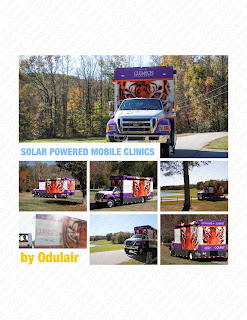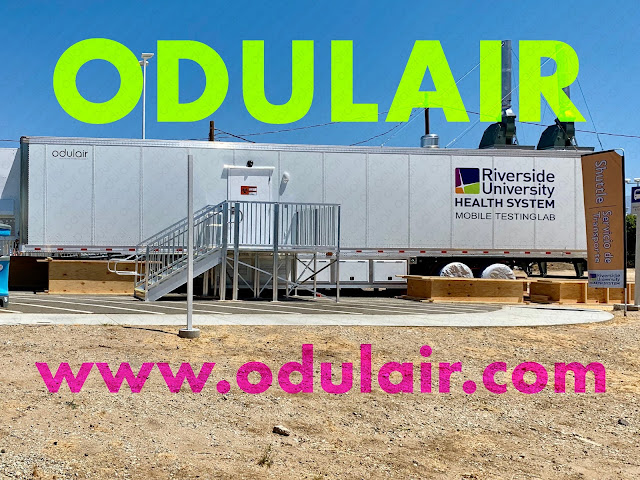Mobile Healthcare Clinics
Mobile Healthcare Clinics
Mobile Healthcare Clinics by Odulair are designed and constructed with the purpose of meeting the environmental, operational, and medical demands associated with providing sustainable healthcare to communities in need. In order to address the expansive range of circumstances in which Odulair clinics are utilized, each unit is designed with highly customizable features. Many factors are considered when developing a mobile clinic, and a great deal of creativity and ingenuity has produced the diverse selection of clinics currently in operation today. Variations in Odulair clinics utilized around the world are determined primarily by factors concerning the types treatments provided, the local environmental conditions, and the social and economic features of the region receiving treatment.
 |
| Mobile Healthcare Clinics by Odulair |
Mobile Medical Vehicles and Types of Treatment Provided
One factor of critical consideration when constructing a mobile medical vehicle is the type of medical treatment that the vehicle will be providing. Treatment demands vary regionally and require differing assortments of medical equipment and structural capabilities. Within the United States, the most frequent healthcare requests are for primary care, followed by dental care, followed by mammography exams. In contrast, there is a much higher demand in developing nations for maternal and child health services, including pre and postnatal care and pediatric care. This distinction exists largely in response to the United Nations Millennium Development Goals, which originally established ambitious targets to reduce infant mortality and maternal mortality by the year 2015, and catalyzed the persisting effort to provide this type of care. The subsequent treatments of the highest demand in developing nations include primary care, followed by surgery, followed by dental care. These variations in medical services are determinants for factors such as the level of medical equipment required, the number of people who will be treated at the clinic, and the duration of clinic activity in a single location.
 |
| Mobile Healthcare Clinics by Odulair |
For treatment types requiring a greater quantity of medical instruments, or requiring particularly heavy medical equipment, it is important to design a clinic that can support the additional weight. In these cases, a 4x4 truck setup may be ideal, because the robust structure of the vehicle is more capable of withstanding the strain of the increased weight. Furthermore, the walls of these vehicles can be reinforced to support the weight of medical equipment that is attached to the interior.
In situations where mobile clinics will typically provide care to a large population of people, or operate in a single location for a long period of time, the size of the clinic is a prominent factor. For the sake of comfort and ease of use, these situations call for larger clinics. A trailer or coach setup can meet these size demands and provide a comfortable setting for large scale medical care.
Mobile Healthcare Clinics: Environmental Factors
Mobile medical clinics often reach communities with difficult environmental conditions, which places a higher demand on vehicle durability. Most commonly, road conditions, distance driven, and the regional climate are factors that can produce challenges for mobile clinics.
Issues pertaining to road conditions and travel distance can most easily be addressed by implementing a 4x4 truck setup. The four-wheel-drive is a highly attractive quality in these situations and can maneuver vehicles through most environments. In extreme circumstances, where there may be no roads at all, a six-wheel-drive is also a viable option. The 4x4 trucks also possess an appealing quality for clinics that drive long distances, because they are generally smaller and more compact. As a result, these vehicles are lighter weight and demand less fuel.
 |
| Mobile Healthcare Clinics by Odulair |
In addition to the considerations associated with transportation, the climate in the region of treatment can produce treatment difficulties. Any situation with extreme temperatures strains energy demand and the quality of medical care provided. In response to this, Odulair offers various wall treatment options that mitigate the effects of these temperatures. In regions of unusually high heat, a clinic may be treated with a UV reflective coat. Similarly, clinics operating in cold climates can utilize a cold condensation reduction coating.
Mobile Medical Clinics: Social/Economic Factors
The social and economic conditions of the region receiving treatment contribute to varying expectations pertaining to comfort, policy complexity, and the availability of both material and professional resources.
Comfort is a factor of higher consideration in urban regions, where travel conditions are generally predictable and patients place a higher value on experiencing a clinical setting that resembles that of a standard medical facility. Mobile clinics with ample space and a relaxing atmosphere are ideal in these scenarios, and the coach-style clinic is most suitable for providing this type of experience. Additionally, Odulair offers a feature known as the Synesthesia Patient Relaxation System, which implements lighting and imagery applications to relax patients during treatment.
Mobile clinics operating in developed or urban regions may also encounter more challenges pertaining to local policy. One prominent example of this type of restriction is the requirement of commercial driver licenses for mobile units over a certain weight or size class in the United States. If medical providers do not want to devote resources to hiring a professional driver, it will be in their best interest to keep the clinic within the restricted weight and size limits.
 |
| Mobile Healthcare Clinic Truck by Odulair |
Finally, the availability of resources is an important variable that directly affects a clinic’s ability to operate effectively. The availability or absence of material resources such as fuel and water may lead a medical provider to consider a mobile clinic with features such as a solar power system or water storage tanks. These features have been successfully implemented in other mobile clinics and reduce concerns associated with operating in the absence of limited resources. The consideration of resource access is also relevant to the availability of medical professionals. In regions where highly educated and trained medical professionals are in short supply, mobile clinic providers will benefit from the implementation of telemedicine technology. This technology allows clinics to connect with medical professionals around the world for advice during complex medical treatments or scenarios.
Odulair Mobile Clinics offer a valuable opportunity to construct a customized vehicle that addresses all of the needs of any given clinical effort. The interactive and comprehensive nature of the process utilized to produce Odulair clinics guarantees a product that can provide remarkable medical care even in the most challenging circumstances. Ingenuity has characterized Odulair products in the past and will continue to serve as a catalyst for development in the future.





